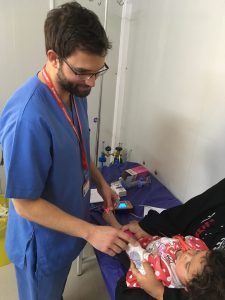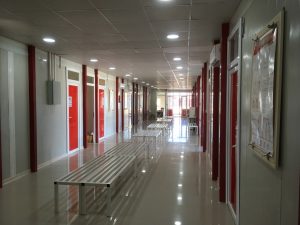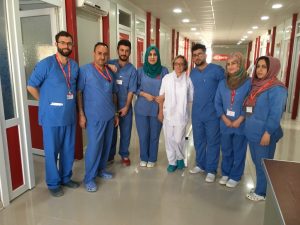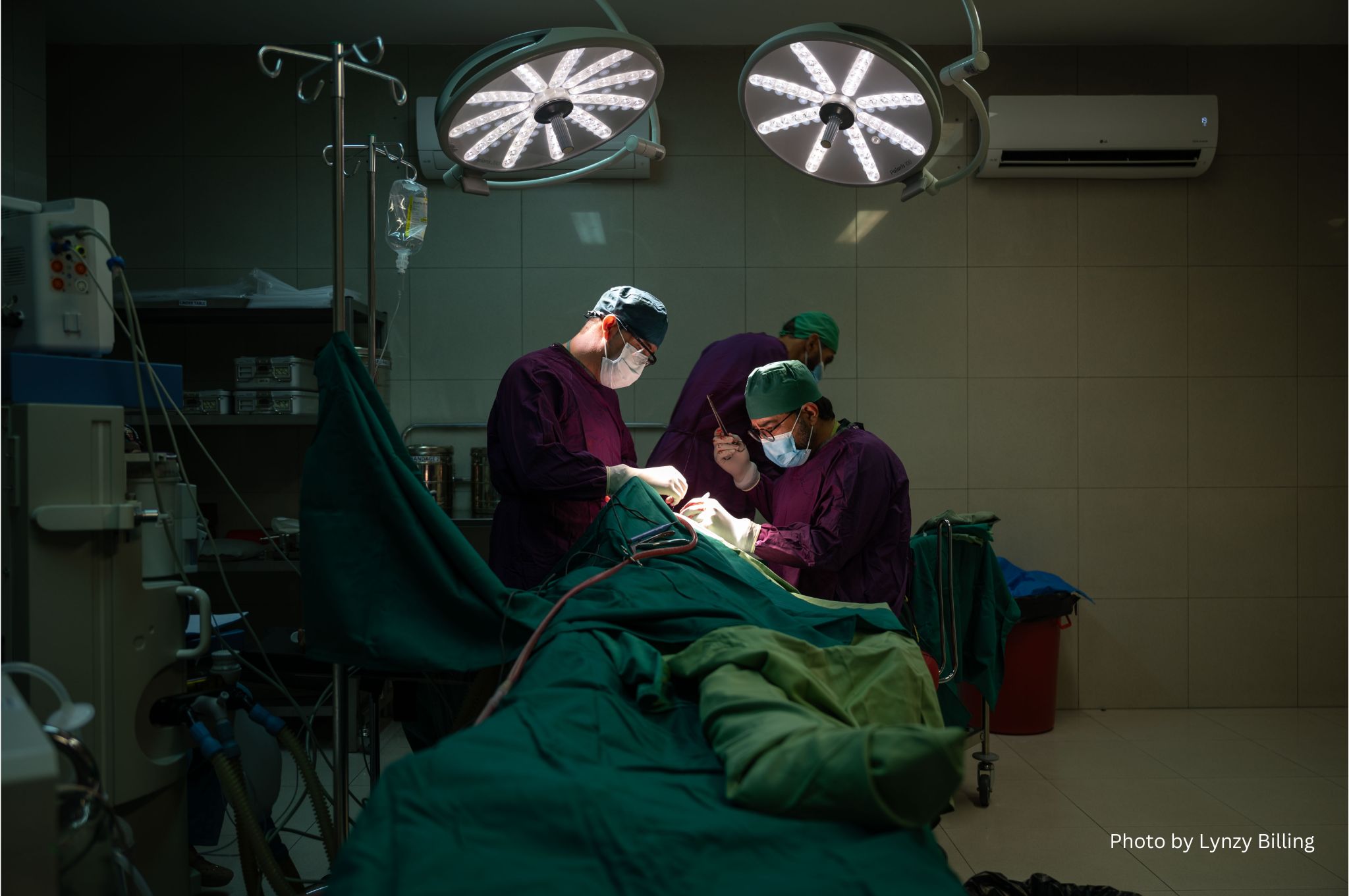In all of EMERGENCY's facilities around the world, we invest in women’s professional development -…

From London to Iraq: A Nurse’s Perspective – Part Two
This is the second instalment in Mark’s blog series. To see the previous entry, click here.
 Hi! My name’s Mark and I’m a British nurse who normally works in an Emergency Department in central London. I am currently on my first mission with EMERGENCY in Iraqi Kurdistan. I previously volunteered in Greece with the Syrian American Medical Society, providing medical care to refugees who had made the crossing from Turkey to Europe. I chose to work with EMERGENCY because of the high standard of their work, their ethos of providing free care to all, and because it gave me the opportunity to work with Syrian refugees and Iraqi IDPs in Iraqi Kurdistan, a community of people I have come to know well through my previous missions. I hope that the following blogs and photos that will be posted on the EMERGENCY UK website can bring you closer to the work that we do every single day.
Hi! My name’s Mark and I’m a British nurse who normally works in an Emergency Department in central London. I am currently on my first mission with EMERGENCY in Iraqi Kurdistan. I previously volunteered in Greece with the Syrian American Medical Society, providing medical care to refugees who had made the crossing from Turkey to Europe. I chose to work with EMERGENCY because of the high standard of their work, their ethos of providing free care to all, and because it gave me the opportunity to work with Syrian refugees and Iraqi IDPs in Iraqi Kurdistan, a community of people I have come to know well through my previous missions. I hope that the following blogs and photos that will be posted on the EMERGENCY UK website can bring you closer to the work that we do every single day.
Working in Ashti ‘Peace’ Camp
EMERGENCY has been working in the Internally Displaced People Camp (IDP) and refugee camps around Sulaymaniyah and Kalar since 2014. They expanded their work here in response to the surge in IDPs caused by the capture of Mosul by ISIS, and the ensuing war which displaced millions of Iraqi people. There are still currently 2.6 million displaced Iraqis according to the UN.
EMERGENCY originally ran four Primary Health Care Clinics (PHCC) in Sulaymaniyah, two in Ashti camp, another in a smaller IDP camp near Ashti camp, and a final one in a Syrian refugee camp near the town of Arbat. As the conflict has reduced and receded following ISIS’ defeat in Mosul, the population of the camps has waned as some people have returned. In turn, EMERGENCY has handed over responsibility of two clinics to the local Ministry of Health (MOH), while maintaining its project in Ashti camp.
The population of Ashti camp is roughly 11,500 people, of which 6,000 are under the age of 14. The residents are mix of Yazidi Kurds and Sunni Arab Iraqis, primarily from rural farming communities in central Iraq and the northern provinces near the Kurdistan region.
Ashti 1 serves as a paediatric clinic, seeing children under the age of 14, as well as hosting a gynaecologist who runs an antenatal clinic for pregnant women several days a week.
All other adult patients are seen in Ashti 2. There is a chronic clinic there several days a week for older patients with chronic illnesses such as heart disease or diabetes.
 The clinics themselves are spacious and well built. Medical staff are predominantly from the Kurdish region, while local people from the camp fill the logistician, security, cleaning and maintenance roles.
The clinics themselves are spacious and well built. Medical staff are predominantly from the Kurdish region, while local people from the camp fill the logistician, security, cleaning and maintenance roles.
The laboratory can carry out basic blood tests and screen for common infections and parasites. Any serious infections or suspected communicable diseases are reported to the WHO immediately. Thereafter, patients are sent to the MOH (Ministry of Health) for further testing. With so many people living in close confines, the threat of outbreaks is taken extremely seriously and monitored closely. To help prevent outbreaks, there are teams from the MOH, based in the clinic, carrying out vaccinations on children and growth monitoring on newborn babies. Indeed, EMERGENCY staff work with this growth monitoring. This includes weighing babies and educating their mothers on breastfeeding.
Alongside the clinical work, EMERGENCY runs a health promotion team, recruited from within the camp. They work with EMERGENCY staff to design education campaigns, which are then carried out among the camp residents by the health promoters and volunteers. These campaigns have ranged from teaching on hygiene and sanitation, breastfeeding, information about communicable diseases and vaccination programmes, treatment of parasites and chronic health conditions. The volunteers are predominantly young people from the camp who carry out the work with a seriousness that reflects their dedication to helping their communities recover from the challenges they are enduring. The Civil Development Organisation (CDO) has recruited and trained women from the camp to serve as midwives. They assist with the antenatal clinic. They are on call every day to assess pregnant women and accompany those in labour to hospital.
EMERGENCY’s long presence and good work in the camp has earned the respect and trust of the camp’s residents.
On a practical level, this means women are able to attend the clinics without a male chaperone, which at least permits us to provide unimpeded medical care. The clinic even serves as an unofficial meeting place where women are able to go, talk, and socialize.
At Ashti 1, we see infants and young children with mild to severe chest infections, premature babies and malnourished children, and the array of cuts, scratches, fractures and foreign bodies that children and young adults can acquire when playing in the camp. Children are accompanied by their parents to the clinic, where they are triaged, weighed and have their vital signs checked by the nurses, before being seen by a doctor. If they are severely unwell, they are brought straight from triage to the observation room and we call the doctor for an immediate consultation. We can administer medications quickly and stabilise the child before the doctor decides whether they can be managed in the clinic or need referral to a hospital in Sulaymaniyah.
The last couple of weeks have been a challenge as there has been a strike of public sector workers across the Kurdistan region, due to a dispute over wages. This has meant most of the public hospitals are not accepting patients except for the most extreme emergencies. There was one young girl, though, who had a very severe case of pneumonia and respiratory distress, and yet her referral was refused. All we could do was administer IV antibiotics and hope for the best. We all spent the night fretting over her wellbeing. Mercifully, her condition improved and, following a course of antibiotics, she has now fully recovered.
 In response to the strike, we had to change the protocols we follow slightly. Children with pneumonia are being followed up more intensively, with daily visits to the clinic for severe cases so we can closely monitor for any improvement or deterioration. Women who enter labour are having to delay their referral to hospital until the last minute, as the maternity hospital will only accept referrals when in the last stages of labour.
In response to the strike, we had to change the protocols we follow slightly. Children with pneumonia are being followed up more intensively, with daily visits to the clinic for severe cases so we can closely monitor for any improvement or deterioration. Women who enter labour are having to delay their referral to hospital until the last minute, as the maternity hospital will only accept referrals when in the last stages of labour.
Although the work can be stressful, there is a lot of camaraderie. The local staff represent all of Iraq’s many different groups, and work together harmoniously to keep the clinic running, by ensuring the patients are treated with respect and dignity. While the situation across Iraq can seem extremely difficult, working in the clinic restores your faith in humanity. You see people from all walks of life. Many of them have suffered immensely through the recent conflict but work together on a common project to serve an impoverished and marginalised community. EMERGENCY’s commitment to building a culture of peace is being demonstrated every day in Ashti Camp.



